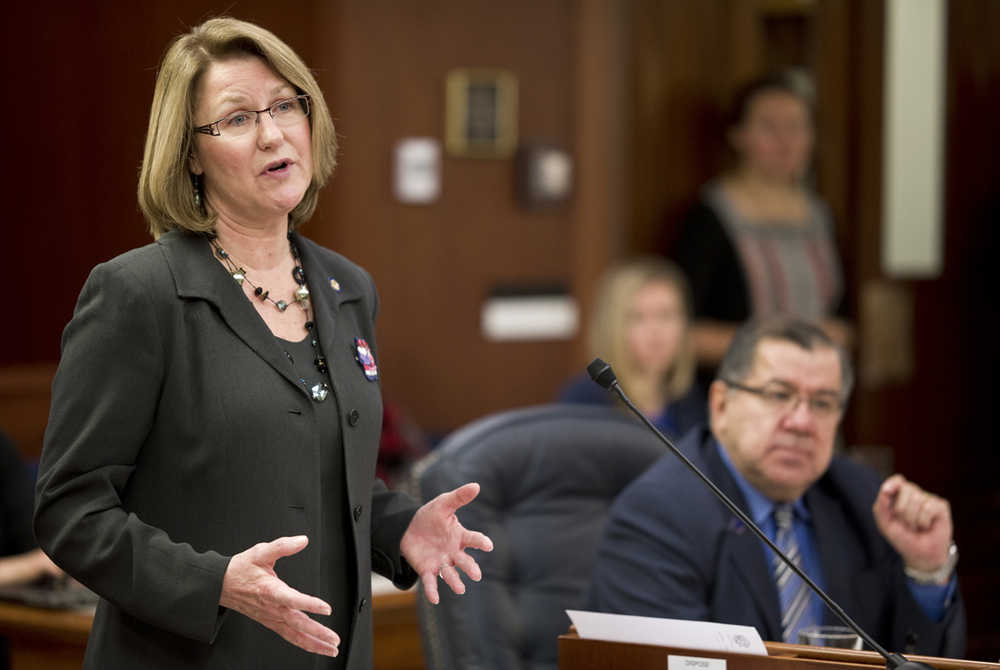The Alaska Senate voted by a wide margin Tuesday morning to approve the state’s buyout of TransCanada and advance the natural gas pipeline project known as AKLNG.
After a 16-3 vote, Senate Bill 3001 moves to the House, where the House Finance Committee has been meeting for 11 days to consider the buyout. The House is expected to hold a final vote on the buyout today, ending the special session called to consider it.
On the Senate floor Tuesday morning, senator after senator rose in support to speak in favor of the buyout and the AKLNG project in general.
Sen. Pete Kelly, R-Fairbanks and co-chairman of the Senate Finance Committee, said he was opposed to the buyout when he arrived in Juneau.
“Over the course of the last 10 or 11 days … I’ve been convinced that it’s a pretty good deal for us,” he said.
SB3001 allocates $161.25 million; of that, $68.5 million will buy out TransCanada. Another $75.6 million will pay for the remaining part of the state’s share of the first phase of AKLNG. The money will come from the state’s Constitutional Budget Reserve, which contained $9.09 billion as of Sept. 30.
As envisioned, AKLNG includes construction of an 800-mile natural gas pipeline from the North Slope to an export terminal on the Cook Inlet at Nikiski. It has been estimated to cost $45 billion to $65 billion, and the state has partnered with North Slope oil and gas companies BP, ConocoPhillips and ExxonMobil to pay that price and build AKLNG.
The state’s share of the project is estimated to be between $12 billion and $18 billion, and in return for spending that sum, it takes one-quarter of all gas that flows through AKLNG.
To avoid paying up front for its one-quarter share in the project, the state entered into a contract with TransCanada. Under the terms of the agreement, TransCanada pays all of the state’s direct costs until construction begins, then half of the state’s share of construction costs. In return, the state gives TransCanada a cut of its revenue once gas starts flowing.
If the pipeline deal falls apart for any reason, or if TransCanada wants to walk away from it, the state must repay TransCanada every dollar plus 7.1 percent interest.
That’s a high interest rate compared to the open market, which is why the state is considering a buyout and is planning to take an “offramp” built into the TransCanada contract. If the state doesn’t act by Dec. 31, its next offramp is years (and hundreds of millions of dollars) later.
“This was probably the cleanest offramp that we could choose,” Kelly said.
The buyout also promises to settle claims pertaining to the state’s failed partnership with TransCanada under the Alaska Gasline Inducement Act, which envisioned a gas pipeline from Alaska to the Lower 48 through Canada.
“The state eliminated a $500 million liability plus the real possibility of treble compensatory damages,” said Sen. Peter Micciche, R-Soldotna. “It represents a significant bargain for the people of Alaska.”
While support for the buyout bill in the Senate was widespread, it was not universal. Sen. Bill Stoltze, R-Chugiak; Sen. Charlie Huggins, R-Wasilla; and Sen. Mike Dunleavy, R-Wasilla all cast “no” votes. Sen. Lesil McGuire, R-Anchorage, was absent.
Speaking before his vote, Dunleavy said he supported the buyout of TransCanada and the pipeline project in general, but he did not support the $13 million the bill allocates to the state departments of law, natural resources and revenue for work associated with the pipeline.
He said he has serious concerns with the way the administration of Gov. Bill Walker is managing the pipeline effort and could not offer his support.
“I think this project is necessary for the future of Alaska, but it needs to be done right,” he said.
Huggins, meanwhile, took a tack opposite to that of Kelly. He said he arrived convinced of the need for a buyout but was swayed to vote “no” by the Walker administration’s actions.
Sen. Cathy Giessel, R-Anchorage, appeared to obliquely respond to Dunleavy’s concerns when she rose to speak in support.
“It’s not the state of Alaska building another fish processing plant that will never be used. This is the real thing,” she said.
The state’s oil-company partners are spending $1 million a day on AKLNG already, and “that’s a big deal,” she said.
If the state hits bumps in the road, she said, “hitting those bumps in the road is an indication that we are moving down the road.”

